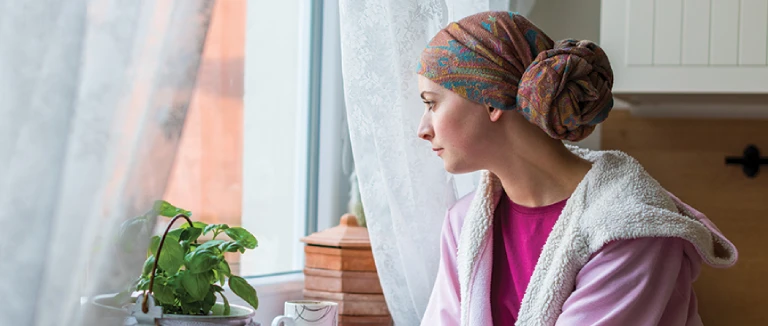Understanding Fatigue During Cancer
Fatigue During Cancer is one of the most common and distressing symptoms experienced by patients at every stage of the disease. It is not just a feeling of being tired but rather an overwhelming sense of exhaustion that affects physical strength, emotional stability, and cognitive function. Many people undergoing cancer treatment describe Fatigue During Cancer as a constant lack of energy that limits their ability to perform daily tasks.
According to Liv Hospital specialists, Fatigue During Cancer can persist for weeks, months, or even years after treatment. This prolonged tiredness is influenced by multiple factors, including the cancer itself, treatment side effects, and emotional distress. Understanding its causes and learning how to manage it are key to improving patients’ quality of life throughout the recovery process.

What Causes Fatigue During Cancer
Fatigue During Cancer can have many underlying causes. The disease itself can trigger changes in metabolism, hormones, and organ function, all of which contribute to exhaustion. Anemia, or a low red blood cell count, is one of the most common causes of Fatigue During Cancer. When there are not enough red blood cells to carry oxygen throughout the body, patients feel weak and tired even after resting.
In some cases, cancer treatments such as chemotherapy, radiation therapy, or immunotherapy can also lead to Fatigue During Cancer. These treatments affect healthy cells in addition to cancer cells, causing inflammation, hormonal changes, and reduced energy levels. Respiratory distress, infection, or changes in appetite may also contribute.
Fatigue During Cancer is particularly common among patients with advanced disease. It is estimated that 14 to 96 percent of patients experience fatigue while actively receiving treatment, and 19 to 82 percent continue to experience it afterward. This wide range shows how individual perception plays a major role in Fatigue During Cancer. Each patient describes it differently, using words like exhaustion, lack of motivation, pain, or weakness.
How Fatigue During Cancer Differs from Normal Fatigue
Fatigue During Cancer is very different from the type of tiredness that healthy individuals experience. Regular fatigue is usually temporary and disappears after sleep or rest. Fatigue During Cancer, however, is persistent and chronic. It can last for long periods and often does not improve even after adequate rest.
Unlike normal tiredness, Fatigue During Cancer can significantly affect bodily functions. It may reduce concentration, decrease coordination, and impair the immune system. Patients often describe it as feeling completely drained, both physically and mentally. Because this fatigue does not respond to typical rest patterns, it requires a comprehensive approach involving medical support, lifestyle adjustments, and emotional care.
The Impact of Fatigue During Cancer
Fatigue During Cancer affects every aspect of a patient’s life. It can alter mood, reduce physical ability, and impair job performance. Many people find it difficult to concentrate or carry out tasks that were once easy. It may also interfere with family responsibilities and social activities, leading to feelings of isolation and frustration.
The severity and timing of Fatigue During Cancer often depend on the type and schedule of treatment. For example, patients undergoing chemotherapy several times a week may feel extreme tiredness immediately after treatment sessions, with mild relief between cycles. In radiation therapy, fatigue tends to build gradually over the course of the treatment and may persist for weeks afterward.
Fatigue During Cancer is not just physical but also emotional. The stress of dealing with a cancer diagnosis, frequent hospital visits, and uncertainty about the future can intensify the feeling of exhaustion. Therefore, addressing Fatigue During Cancer involves not only treating physical causes but also supporting emotional well-being.
Recommendations to Ease Fatigue During Cancer
Managing Fatigue During Cancer requires a combination of rest, activity, nutrition, and emotional support. While there is no single remedy, small adjustments can make a significant difference in daily comfort and energy levels.
Rest, but Do Not Overdo It
Adequate rest is important, but excessive inactivity can worsen Fatigue During Cancer. Plan short naps of 30 minutes or less throughout the day and try to maintain 7 to 8 hours of sleep at night. A consistent sleep routine helps regulate energy levels. If sleep problems persist, it is essential to consult a doctor to address possible causes such as pain or anxiety.
Be as Active as Possible
Contrary to what many believe, light physical activity can help reduce Fatigue During Cancer. Moderate exercises such as walking, stretching, or yoga improve circulation, enhance mood, and increase energy levels. Walking is particularly effective, as it strengthens muscles and boosts oxygen supply. Regular movement also helps regulate hormones and reduce stress, both of which play a role in Fatigue During Cancer.
Plan Your Daily Tasks
Keeping a daily journal can help manage Fatigue During Cancer. Record your energy levels and note what activities make you feel more or less tired. Doctors and nurses may ask you to rate your fatigue on a scale of 0 to 10. This helps them understand patterns and suggest practical solutions. Scheduling demanding tasks when you have the most energy can make the day easier to manage.
Reserve Your Energy
Fatigue During Cancer often requires patients to rethink how they approach daily responsibilities. Prioritize essential tasks and delegate less important ones. Take frequent breaks between activities and avoid standing for long periods. Even small changes, such as sitting while cooking or using supportive furniture, can conserve energy. Hot showers and baths should be limited in duration, as prolonged heat can increase tiredness.
Ask for Help
Do not hesitate to seek help from family and friends. Many patients feel reluctant to ask for assistance, but support from loved ones is vital during cancer treatment. Whether it is help with cooking, cleaning, or running errands, sharing responsibilities can ease the burden of Fatigue During Cancer. Emotional support from family also plays an important role in recovery.
Join a Support Group
Emotional well-being has a direct impact on physical strength. Joining a support group allows patients to share experiences and learn coping strategies from others going through similar challenges. Talking openly about feelings of frustration or fear can help relieve stress, which in turn may reduce Fatigue During Cancer. Doctors and nurses can guide patients to reputable support groups and counseling services.
Maintain Good Nutrition
Proper nutrition is essential for managing Fatigue During Cancer. Staying hydrated and eating balanced meals provide the body with the energy it needs to recover. Aim to consume at least 2.5 bowls of fruits and vegetables daily, along with enough protein and calories. Drinking water, fresh fruit juice, and herbal teas can help maintain hydration. Avoid skipping meals and try to eat smaller, frequent portions if appetite is low.
When to Call Your Doctor
Patients should contact their healthcare provider immediately if Fatigue During Cancer becomes severe. Warning signs include extreme weakness that prevents getting out of bed, confusion, loss of balance, frequent dizziness, or fainting. These symptoms may indicate anemia, infection, or another underlying issue that requires medical attention.
Doctors may recommend tests to determine if fatigue is caused by nutritional deficiencies, hormone imbalances, or medication side effects. Addressing these issues early can help restore energy and improve overall health.
Recovery and Long-Term Management
Recovering from Fatigue During Cancer takes time and patience. While the duration and intensity vary for each individual, staying active and maintaining a positive mindset can accelerate recovery. Combining medical treatment with lifestyle changes such as balanced nutrition, physical activity, and stress management can significantly reduce fatigue levels.
Fatigue During Cancer may not disappear overnight, but through consistent care and self-awareness, patients can regain their strength and vitality. With the right strategies and professional support, it is possible to live a full, active life during and after cancer treatment.
* Liv Hospital Editorial Board has contributed to the publication of this content .
* Contents of this page is for informational purposes only. Please consult your doctor for diagnosis and treatment. The content of this page does not include information on medicinal health care at Liv Hospital .
For more information about our academic and training initiatives, visit Liv Hospital Academy
Frequently Asked Questions
What causes Fatigue During Cancer?
It results from a combination of cancer itself, treatments like chemotherapy or radiation, anemia, poor nutrition, and emotional stress.
How is Fatigue During Cancer different from normal tiredness?
Unlike ordinary fatigue, it does not improve with rest and can last for weeks or months, affecting both body and mind.
Can exercise help with Fatigue During Cancer?
Yes. Light physical activity such as walking or yoga improves circulation, mood, and energy levels, reducing fatigue over time.
What role does sleep play in managing Fatigue During Cancer?
Regular sleep routines and short daytime naps help balance energy levels, while too much rest can worsen fatigue.
Why is nutrition important during cancer treatment?
Eating balanced meals and staying hydrated supports the body’s recovery, strengthens immunity, and boosts overall energy.
When should patients call their doctor about fatigue?
If extreme weakness, confusion, dizziness, or fainting occurs, patients should contact their healthcare provider immediately.
How can emotional support help with Fatigue During Cancer?
Sharing experiences through family, friends, or support groups reduces stress and enhances emotional and physical well-being.



